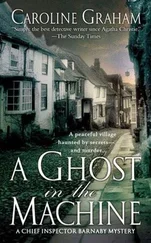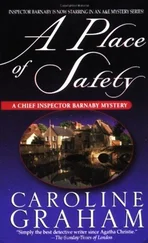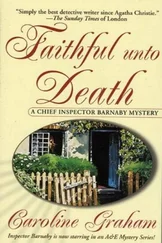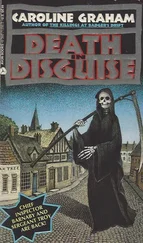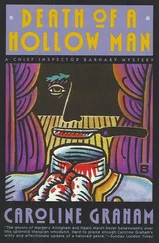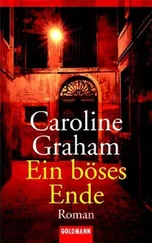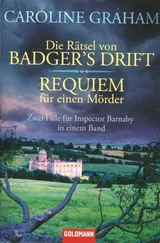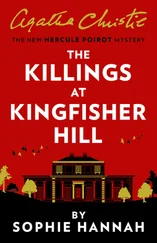‘Yes.’
‘Well I’ve remembered what it was. I’ll tell you now shall I?’
‘Yes please.’
‘I was in High Wycombe yesterday with my sister. I’m going to be her bridesmaid next month, you see, and we went to try on my dress. The shop’s quite near the station actually, which means you can sometimes squeeze the car in - not for long of course - and it’s called Anna Belinda. And that’s what Miss Simpson said. Well, nearly.’
‘Do you remember exactly?’
‘Yes I do. She said, “Just like poor Annabella.”’
‘You’re sure?’
‘Positive.’
‘Not simply Bella?’
‘No. It was definitely Annabella.’
Barnaby replaced the phone and sat staring at it thoughtfully. His sandwich (chicken and watercress) arrived, and some delicious coffee from the office hotplate. Barnaby took it saying, ‘Give the Social Services a ring, would you? I think someone should call at seven Burnham Crescent, Badger’s Drift.’
‘What shall I say, sir?’
‘Ohh ... possible child abuse. The woman’s name is Quine. She needs help too. On the verge of a breakdown, I would say. And if you could get on to Slough. I need the address and number of a Mrs Norah Whiteley. She’s a domestic science teacher. One son aged nine.’ He took a ravenous bite of his sandwich, reducing it by half, picked up the receiver and dialled again.
‘Miss Bellringer? Do you happen to know if your friend knew anyone called Annabella?’ There was a longish pause then a negative reply. ‘It wouldn’t perhaps be Mrs Trace?’
‘Oh no ... her name was Beatrice. She called herself Bella because she thought it was more glamorous.’
‘But did Miss Simpson know this?’
‘She did indeed. I remember her saying to me what a mistake it was. She thought Beatrice a beautiful name. And Bella rather common.’ She paused for breath. ‘There was an Isabella in my music class years ago. An immaculate child. I believe she’s now a deaconess. Is that any help?’
Barnaby thanked her and said goodbye. He had forgotten for the moment that Miss Simpson had been a teacher for over forty years. The chances were that, even given the comparative rarity of the name, one or two Annabellas may have passed through her hands, swanking brightly amongst the mousey Jeans and Joans and Junes and Janes. But then Miss Simpson’s recollection of the name had been triggered by the sight of a fornicating couple. How young had they started having it away twenty, thirty, forty years ago? Probably, he reflected, about as young as they did now. Some things never changed.
And why poor Annabella? He took another swig of his coffee and watched, out of the corner of his eye, an abseilling spider swing back and forth. Had she been destitute? Depraved? Dead? Barnaby thought of all the characters an eighty-year-old woman could have met with in a long and fairly well-travelled life. And heard about. And read about. He sighed, took another bite of his sandwich and faced the facts. Annabella could be practically anybody.
‘Something I can do, sir?’ asked Troy.
‘Yes.’ Barnaby emptied his mug. ‘You can run me over to the Echo . I want to read the account of Bella Trace’s death.’
‘You don’t think there’s any connection?’
‘I don’t think anything at this stage. But it’s an unnatural death in the same small area involving a circle of people whom we must now regard as suspect. It can’t be overlooked. So finish your tea and look sharp about it.’
In a basement beneath the offices of the Causton Weekly Echo Barnaby spoke to an old man who seemed as much a fixture of the place as the ancient green filing cabinets and rusty water pipes writhing over the back wall. There was a huge boiler too, now unlit and quiet.
Barnaby asked to see the editions for September and October the previous year. The old man shuffled off to the files and shuffled back. He didn’t speak or even remove the loosely wrapped unlit cigarette from his mouth. A few shreds of ginger tobacco fell on the newspapers as he handed them over. Barnaby took them to a reading stand by the window. The light was poor, the panes being of thick cobbled glass the colour of milk laced with whisky. To the accompaniment of a variety of overhead footsteps he flicked through the first two copies. The inquest on the death of Mrs Bella Trace was in the third. It was reported extensively and took up over half a page.
The shooting party had been a small one as these things go. Henry Trace, David Whiteley (who was described in a delicately worded if unnecessary addendum as assisting Mr Trace), Doctor T. Lessiter, friend of Mr Trace and also his personal physician, Mrs Trace, Miss Phyllis Cadell and two neighbouring landowners George Smollett and Frederick Lawley. Plus two beaters: Jim Burnet, a farm boy, and Michael Lacey, a young friend of the family.
Mrs Trace was apparently a few yards away from the main party when the accident occurred. As always on these occasions the accounts were confused and sometimes contradictory. Doctor Lessiter thought she had stumbled and was actually falling when the shot ran out, implying that she had tripped and fallen over her gun. She had already stumbled once over a tree root. The doctor admitted that this earlier incident might have contributed to his view of Mrs Trace’s death. Michael Lacey said the shot came first but, after being questioned closely by the coroner, seemed less sure. The rest of the group noticed nothing until Mrs Trace was seen to be lying on the ground. Mr Trace, desperate to get to his wife, wrenched his wheelchair round too quickly and tipped it over. The dogs were rushing everywhere; all was confusion. Michael Lacey, nearest to Mrs Trace at the time, ran to the spot but was instructed by the doctor not to touch the injured woman but to run and phone for an ambulance.
Giving evidence, Doctor Lessiter said that Mrs Trace was dying even as he reached her. There was nothing anyone could have done. She did not speak but lost consciousness almost immediately and died a few moments later. There were some technical post-mortem details describing the angle at which the shot had entered the heart and left the body, splintering one of the vertebrae. The point was made both by Doctor Lessiter and Mr Trace that, at the time of the accident, all the other members of the party with the exception of Jim Burnet had been either behind or to the left of Mrs Trace and therefore could not have fired the fatal shot. Jim, although ahead, had been a good thirty yards to her right. Although both beaters had returned later, on Mr Trace’s instructions, to search for the shot it had, not unnaturally given the dense surrounding woodland, remained unfound. The coroner expressed his condolences to the bereaved man and issued a verdict of Accidental Death.
Barnaby read the report again. It was very clearly written, everything seemed quite straightforward, yet there was something bothering him. Something buried in there that didn’t seem quite right.
He returned three of the papers to the desiccated old man - who seemed even less interested to have them back than he was to part with them in the first place - and showed his warrant card. ‘I’d like a photostat of this report,’ he said, drawing a rapid circle around the details of the inquest.
‘’Ere!’ The remains sparked inadvertently to life. ‘You can’t do that. That’s from the files!’
‘Is it?’ Barnaby looked at the circle severely and shook his head. ‘I don’t know what the world’s coming to and that’s a fact. By four o’clock if that’s all right with you.’
The chief inspector noticed as Troy drove down Church Lane that Beehive Cottage already had a faintly neglected air, like that of a recently abandoned shell. The edging plants were straggling over the path, the curtains hung straight and still. On the wall outside Miss Bellringer’s house Wellington lay, swiping at and occasionally consuming passing butterflies.
Читать дальше

